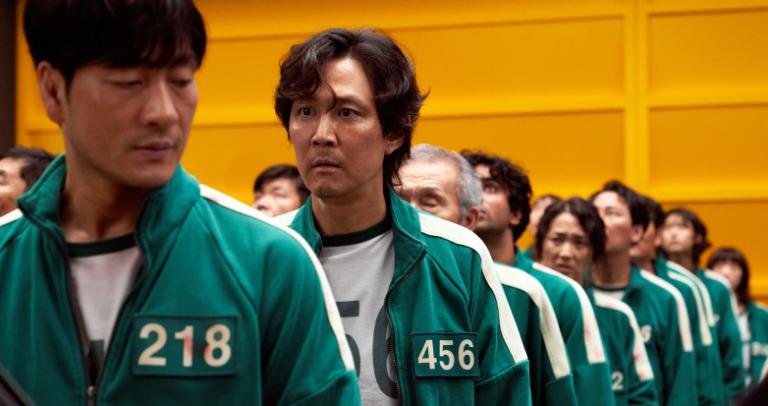
Squid Game is on its way to passing Bridgerton as Netflix’s most popular series. But, while Shonda Rhimes’ sexed-up Regency romp didn’t interest me, Squid Game had me pretty quickly.
In the nine-episode series, which dropped in mid-September, various down-and-out people in South Korea are tempted into playing games with the hopes of winning a huge cash prize. But, losing at these games costs you everything.
Who Created Squid Game?
Well-written, stylish and engrossing, it’s the creation of South Korean writer-director Hwang Dong-hyuk, who says he first came up with the idea in 2008 while in tough financial straits himself. He was living in Internet cafés, reading Japanese manga (comics and graphic novels). He’s also a fan of Japanese anime.
Some of these works feature people involved in deadly games, but Hwang’s innovation was to use simple children’s games (more about those here).
In an interview in Variety, he said:
“I wanted to write a story that was an allegory or fable about modern capitalist society, something that depicts an extreme competition, somewhat like the extreme competition of life. But I wanted it to use the kind of characters we’ve all met in real life,” Hwang said. “As a survival game, it is entertainment and human drama. The games portrayed are extremely simple and easy to understand. That allows viewers to focus on the characters, rather than being distracted by trying to interpret the rules.”
Is Squid Game Just About Greed and Exploitation?
Some reviewers have agreed with Hwang in saying that Squid Game (available either dubbed in English with Korean subtitles, or in its original Korean with English subtitles) is a criticism of capitalism and the wealthy’s exploitation of the poor.
It’s not exactly subtle that the money the characters are playing for drops into a giant piggy bank over their heads, to the accompaniment of chirpy chiptone music.
But, it’s not that simple.
No matter how dire the circumstances, each character has the freedom to make choices. The fact that many of them made bad choices that landed them in this circumstance doesn’t mean there weren’t, or aren’t, still options.
In the fight for survival, some act nobly, some with cowardice, and others with outright malice — and some aren’t what they seem at the beginning.
The game also purports to offer each player a fair and equal chance — a good reminder that, if we’re honest with ourselves, we really don’t want life to be fair and for each of us to get just what we truly deserve.
What Happens in Squid Game?
Squid Game focuses on 47-year-old Seong Gi-hun (Lee Jung-jae). After being fired from his job at a car company during a violent strike, he has lost his wife and daughter to another man. Now, deeply in debt to gangsters, he gambles with money he steals from his ailing mother, with whom he lives.
In a train station, Gi-hun meets a well-dressed stranger who strikes up a conversation. At first, Gi-hun brushes him off, thinking that he’s a Christian evangelist, and claiming that he comes from a long line of Buddhists.
But, the stranger seems to know Gi-hun’s problems and offers to play a game with him. When Gi-hun ultimately wins, the offer comes later to join the larger games.
Gi-hun and the other 455 players are gassed into unconsciousness, only to wake up in green tracksuits, wearing numbers, in a bare-bones dormitory. Money troubles and desperation have brought them there, whether it’s an embezzling graduate (Park Hae-soo) from a prestigious university, or a North Korean refugee (Jung Ho-yeon) trying to get her brother out of an orphanage and her mother out of the North.
When classical music plays, they are ushered into vast, elaborate settings to play games of apparent simplicity, which prey on their fears, hopes, better angels, and worst impulses. Meanwhile, behind the scenes, an infiltrator and a moneymaking scheme threaten to expose the whole operation.
Just so you know, Squid Game is gory and violent. There’s some sexual content and brief upper-body female nudity, along with some bad language (not sure how accurate the English translation is).
Also, in the dubbed version, the effort to match mouths winds up with some odd lines of English dialogue that I’m sure played better in the original language.
Christianity in Squid Game
Squid Game also has an ambiguous relationship with Christianity.
About 29 percent of Koreans are Christian, with about three-quarters Protestant and one-quarter Catholic. After Gi-hun mistakes the man who approached him as a preacher, there’s also a Christian player, Number 244, who frequently refers to God and faith and reverts to prayer.
This earns him the scorn of a young female player (Lee Yoo-mi), who comes from an abusive Christian background. Ultimately, though, she understands the concept of sacrifice better than most of the other players.
Also, a pivotal moment in the show takes place on Christmas Eve, and you can interpret that choice any way you want.
While there are deep moral questions raised in Squid Game, it can be rough to watch, and it’s absolutely not for the whole family. All episodes are currently available on Netflix.
Image: Netflix, photo credit: YOUNGKYU PARK
Don’t miss a thing: Subscribe to all that I write at Authory.com/KateOHare














